七)最后的骑士的大蒜名言
堂吉诃德的心上人杜尔西娜(Dulcinea)是一位一位身强力壮、嗓门奇大、性格泼辣的村妇,却被堂吉柯德视为公主或贵妇人,并称为"托博索的杜尔西娜”。
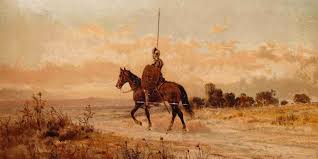
小说《堂吉柯德》第二卷第十章,堂吉柯德对桑乔讲了一段令人发笑的话:“桑乔,你觉得怎么样?那些魔法师有多么恨我啊!你看,他们竟然恶毒到这个程度,剥夺我见到意中人本来面目的快乐。事实上,我天生就是不幸的人,是逆境之箭瞄向的目标。你也看到了,桑乔,这些背信弃义的家伙不满足于改变我的杜尔西娜的模样,他们还把她变成了像那个令人讨厌的粗鄙农妇的样子,同时剥夺了她作为贵妇人所特有的东西,也就是那种鲜花和香水的香气。我必须告诉你,桑乔,当我把杜尔西娜抱上她的哈克尼马的马背上时(也就是你说的那种马,虽然对我来说它看起来像一只母驴),我闻到了一股生蒜味,差点把我熏死了。”
(注:hackney,哈克尼马,是14世纪在不列颠岛开发的一种既强壮又有魅力而且小跑出众的马,用作一般用途的骑乘马。)
( “How now, Sancho? thou seest how I am hated by enchanters! And see to what a length the malice and spite they bear me go, when they seek to deprive me of the happiness it would give me to see my lady in her own proper form. The fact is I was born to be an example of misfortune, and the target and mark at which the arrows of adversity are aimed and directed. Observe too, Sancho, that these traitors were not content with changing and transforming my Dulcinea, but they transformed and changed her into a shape as mean and ill-favoured as that of the village girl yonder; and at the same time they robbed her of that which is such a peculiar property of ladies of distinction, that is to say, the sweet fragrance that comes of being always among perfumes and flowers. For I must tell thee, Sancho, that when I approached to put Dulcinea upon her hackney (as thou sayest it was, though to me it appeared a she-ass), she gave me a whiff of raw garlic that made my head reel, and poisoned my very heart.” )
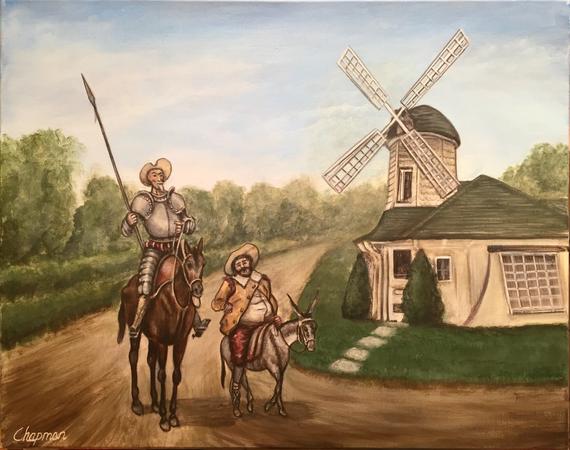
杜尔西娜的满身蒜味暴露了她的低贱的村妇身份,因为当时的贵族女人是抗拒食大蒜的。
第二卷第三十一章,公爵夫人的保姆和桑乔发生了争吵,情节如下:
“婊子养的!”,保姆怒不可遏,说道,“我年纪老不老,我自己会告诉上帝,用不着告诉你,你这个满身蒜味的无赖!”她说得很大声,公爵夫人都听到了,转过身来,看到保姆如此激动,眼睛发红,就问她跟谁在吵架。
“和这位好人吵架,”保姆说:“他特别要求我去把他那只在城堡门口的驴子放进马厩,还举例说,不知是在什么地方— 几位夫人在恭候兰斯洛特,有女仆照看他的驴。还有,到了最后,他说我老。”
(“Son of a bitch,” said the duenna, all aglow with anger, “whether I’m old or not, it’s with God I have to reckon, not with you, you garlic-stuffed scoundrel!” and she said it so loud, that the duchess heard it, and turning round and seeing the duenna in such a state of excitement, and her eyes flaming so, asked whom she was wrangling with.
“With this good fellow here,” said the duenna, “who has particularly requested me to go and put an ass of his that is at the castle gate into the stable, holding it up to me as an example that they did the same I don’t know where—that some ladies waited on one Lancelot, and duennas on his hack; and what is more, to wind up with, he called me old.” )
(注:Lancelot, 兰斯洛特,是亚瑟王的圆桌骑士团的成员之一。他出现在很多法国小说和文学作品中,他被描述为亚瑟王最伟大最受信任的骑士)。

通过阅读这部小说的英文版本,我发现西班牙人用“满身蒜味”(garlic-stuffed)来咒骂乡巴佬。
第二卷第三十五章,堂吉柯德与桑乔发生了争执,也用了“满身蒜味”一词。情景如下:
“顺其自然吧!”桑乔说:“别说打三千鞭子,就是打三鞭子,也和我用匕首捅自己三刀一样疼。那个魔鬼用这种方法来解除魔法!我看不出我的臀部与魔法有什么关系。上帝啊,如果梅尔林大人找不到另外的方法解除托博索的杜尔西娜夫人所遭受的魔法,还是让她带着魔法进坟墓吧。”
“但是我会带着你,满身蒜味的小丑,”堂吉柯德说:“然后把你绑在树上,一丝不挂,就像你母亲刚把你生出来那样。打你六千六百鞭子,而不是三千三百鞭子,而且要打得结结实实的,即使你挣扎三千三百次也挣脱不了。别再和我顶嘴,否则我就宰了你。”
“By all that’s good,” exclaimed Sancho at this, “I’ll just as soon give myself three stabs with a dagger as three, not to say three thousand, lashes. The devil take such a way of disenchanting! I don’t see what my backside has got to do with enchantments. By God, if Senor Merlin has not found out some other way of disenchanting the lady Dulcinea del Toboso, she may go to her grave enchanted.”
“But I’ll take you, Don Clown stuffed with garlic,” said Don Quixote, “and tie you to a tree as naked as when your mother brought you forth, and give you, not to say three thousand three hundred, but six thousand six hundred lashes, and so well laid on that they won’t be got rid of if you try three thousand three hundred times; don’t answer me a word or I’ll tear your soul out.”
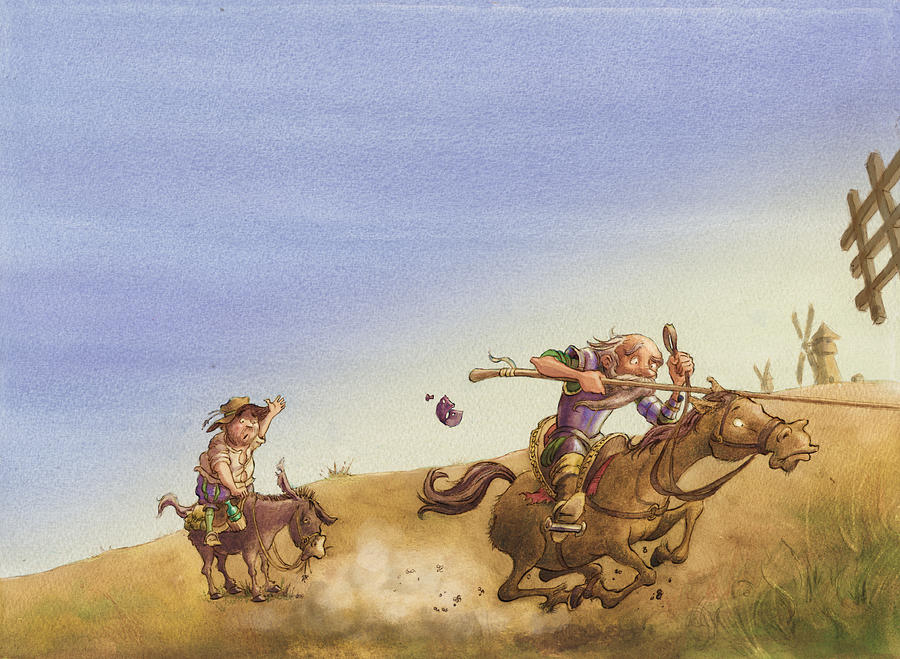
第二卷第五十章,桑乔的老婆特雷莎和女儿桑奇卡听说桑乔当了总督后,非常开心,想坐马车去京城。母女之间有一段开心的对话,如下:
“为什么不呢,妈妈!”桑卡奇说; “对上帝来说,今天就是今天,而不是明天。即使别人看见我和妈妈坐在车上,说,‘你们看那个垃圾,那个满身蒜味的家伙的女儿,舒舒服服地坐在马车上,像个女教皇!’让他们去踩烂泥吧,我可得乘车,脚不沾地。背后说人坏话的人永远倒大霉。‘反正我暖和了,他们随便笑吧。’我说的对吗,妈妈?”
“你说得太对了,孩子,”特雷莎说。 “所有这些好运,以后还会更多,我的好桑乔都向我预言过了。你看着吧,我的女儿,他还会让我当上伯爵夫人……”
(“And why not, mother!” said Sanchica; “would to God it were to-day instead of to-morrow, even though they were to say when they saw me seated in the coach with my mother, ‘See that rubbish, that garlic-stuffed fellow’s daughter, how she goes stretched at her ease in a coach as if she was a she-pope!’ But let them tramp through the mud, and let me go in my coach with my feet off the ground. Bad luck to backbiters all over the world; ‘let me go warm and the people may laugh.’ Do I say right, mother?”
“To be sure you do, my child,” said Teresa; “and all this good luck, and even more, my good Sancho foretold me; and thou wilt see, my daughter, he won’t stop till he has made me a countess……)
母女的对话进一步证明桑乔是很喜欢吃大蒜的。
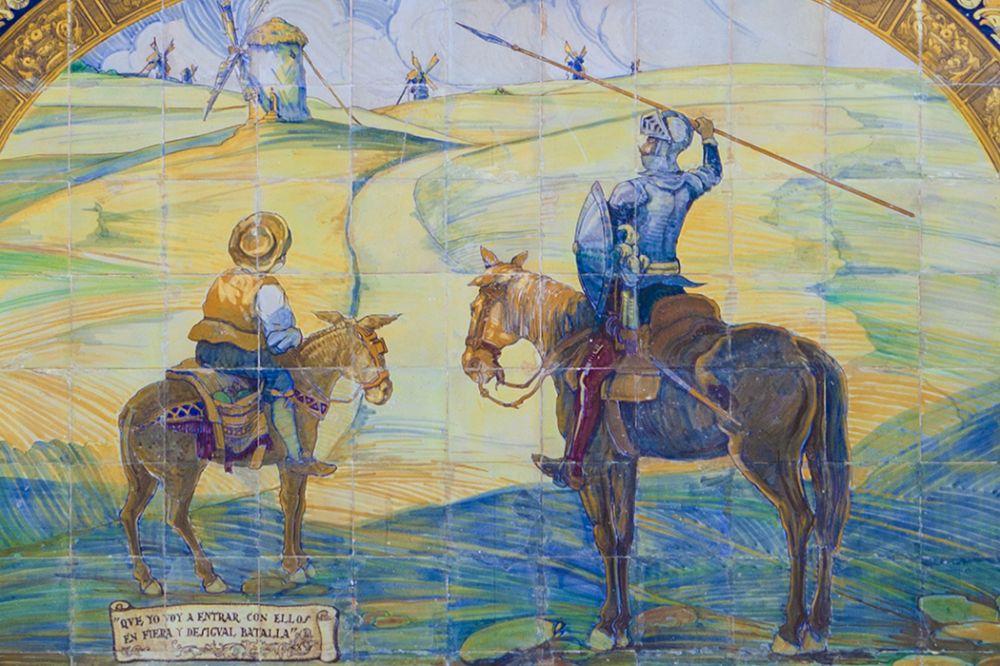
这部巨著里被后人引用最多的关于大蒜的名言,是堂吉柯德对桑乔的那句劝诫:“不要吃大蒜和洋葱,免得他们从气味中发现你是乡巴佬。”(Eat not garlic nor onions, lest they find out thy boorish origin by the smell)。这句话出现在第二卷第四十三章,堂吉柯德口若悬河,教育桑乔如何做一个好总督和上等人。塞万提斯(Miguel de Cervantes ,1547-1616)通过堂吉柯德之口表达了作者本人对领导艺术的见解。现将部分金句翻译如下:
“谁听了堂吉柯德上述这番话,不会把他当成一个足智多谋、见识远大的人呢?不过,就像这部巨著经常记述的那样,他只有在谈到骑士精神时才胡说八道,而在讨论其他话题时,他的见解清晰公道,所以他时时出现言行不符的情况。但他给桑乔的第二部分忠告时,他表现出一种活泼的幽默感,充分展现着他的智慧和愚蠢。”
(Who, hearing the foregoing discourse of Don Quixote, would not have set him down for a person of great good sense and greater rectitude of purpose? But, as has been frequently observed in the course of this great history, he only talked nonsense when he touched on chivalry, and in discussing all other subjects showed that he had a clear and unbiassed understanding; so that at every turn his acts gave the lie to his intellect, and his intellect to his acts; but in the case of these second counsels that he gave Sancho, he showed himself to have a lively turn of humour, and displayed conspicuously his wisdom, and also his folly. )
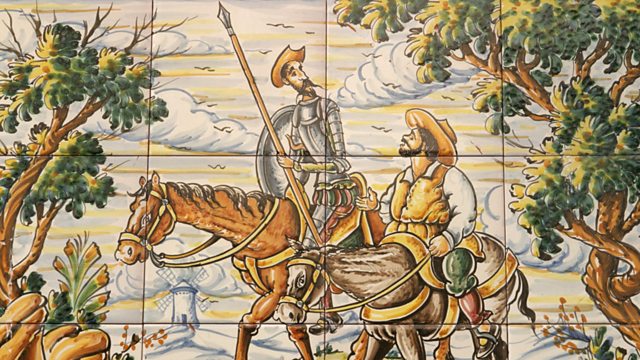
“桑乔全神贯注地听着,努力地将这些忠告记在脑子里,以便遵照这些话做个好总督。堂吉柯德接着说道:
‘关于如何管理你自己和你的家,桑乔,我给你的首要任务是保持清洁,要剪指甲,不要像某些人那样,留着长长的指甲,无知地以为长长的指甲使他们的双手更美,似乎他们疏于切割的多余物是指甲,而不是捉捕蜥蜴的猎鹰的爪子 – 一种肮脏和悖逆天道的陋习。’
‘不要衣冠不整、邋邋遢遢的,桑乔。因为衣冠不整是精神不振的一种征兆,除非是故意用邋遢和懈怠来骗人的,就像人们对凯撒大帝的普遍看法那样。”
(Sancho listened to him with the deepest attention, and endeavoured to fix his counsels in his memory, like one who meant to follow them and by their means bring the full promise of his government to a happy issue. Don Quixote, then, went on to say:
“With regard to the mode in which thou shouldst govern thy person and thy house, Sancho, the first charge I have to give thee is to be clean, and to cut thy nails, not letting them grow as some do, whose ignorance makes them fancy that long nails are an ornament to their hands, as if those excrescences they neglect to cut were nails, and not the talons of a lizard-catching kestrel—a filthy and unnatural abuse.
“Go not ungirt and loose, Sancho; for disordered attire is a sign of an unstable mind, unless indeed the slovenliness and slackness is to be set down to craft, as was the common opinion in the case of Julius Caesar. )

“谨慎地确认你的职位的价值。如果你想给你的佣人们做制服,给他们大方实惠的,不要花里胡哨的。把这些服装分给你的佣人和穷人,也就是说,如果你做六件制服,分三件给佣人,三件给穷人,这样你在天堂和人间都有人伺候了。那些目空一切的人从不会想到这种做衣服的办法。
“不要吃大蒜和洋葱,免得他们从气味中发现你是乡巴佬。走路要慢,说话要从容,不过不要小声得像说给自己听,因为所有的装腔作势都是不好的。”
“饮食要节制,尤其晚饭要吃得更少,因为身体健康全靠胃消化得好。
(“Ascertain cautiously what thy office may be worth; and if it will allow thee to give liveries to thy servants, give them respectable and serviceable, rather than showy and gay ones, and divide them between thy servants and the poor; that is to say, if thou canst clothe six pages, clothe three and three poor men, and thus thou wilt have pages for heaven and pages for earth; the vainglorious never think of this new mode of giving liveries.
“Eat not garlic nor onions, lest they find out thy boorish origin by the smell; walk slowly and speak deliberately, but not in such a way as to make it seem thou art listening to thyself, for all affectation is bad.
“Dine sparingly and sup more sparingly still; for the health of the whole body is forged in the workshop of the stomach. )
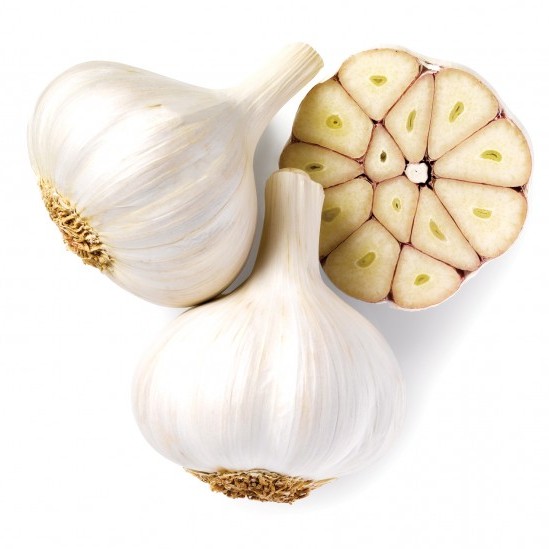
“喝酒要节制,要记住酒喝多了不容易保守秘密,又误事。”
“注意,桑乔,吃东西时不要狼吞虎咽,不要在别人面前打嗝。”
(“Be temperate in drinking, bearing in mind that wine in excess keeps neither secrets nor promises.
“Take care, Sancho, not to chew on both sides, and not to eruct in anybody’s presence.” )
……….
“同样,桑乔,”堂吉柯德说,“你说话时不要混入那么多俗语。虽然俗语是简短的格言,但你确实经常牵强附会说了太多,听起来不像格言,更像胡说八道。”
(“Likewise, Sancho,” said Don Quixote, “thou must not mingle such a quantity of proverbs in thy discourse as thou dost; for though proverbs are short maxims, thou dost drag them in so often by the head and shoulders that they savour more of nonsense than of maxims.”)
……
“你骑马时,身子不要懒洋洋地往后仰,也不要直着两条腿或不夹马肚子,骑马时不要像骑你的驴子那样吊儿郎当的。有些人骑马像绅士,有些人就像马夫。
“不要贪睡,不早起的人浪费了一个白天。记住,桑乔,勤奋是成功之母,相反的,懒惰永远达不到既定目标。
“我现在要给你的最后一个忠告,尽管并不能使身体得到改善,但我希望你永远记住它,因为我相信,它对你的作用将不亚于我已经给你的那些忠告。这就是- 永远不要参与有关家世的争执,至少不要互相比较,一比就会有高低,被你比下去的会憎恨你,比你高的也不会抬举你。”
“你应该穿紧身长裤,配长紧身外套,斗篷也要长些。千万不要穿肥马裤,因为绅士和总督穿肥马裤都不好看。 ”
(“When thou ridest on horseback, do not go lolling with thy body on the back of the saddle, nor carry thy legs stiff or sticking out from the horse’s belly, nor yet sit so loosely that one would suppose thou wert on Dapple; for the seat on a horse makes gentlemen of some and grooms of others.
“Be moderate in thy sleep; for he who does not rise early does not get the benefit of the day; and remember, Sancho, diligence is the mother of good fortune, and indolence, its opposite, never yet attained the object of an honest ambition.
“The last counsel I will give thee now, though it does not tend to bodily improvement, I would have thee carry carefully in thy memory, for I believe it will be no less useful to thee than those I have given thee already, and it is this—never engage in a dispute about families, at least in the way of comparing them one with another; for necessarily one of those compared will be better than the other, and thou wilt be hated by the one thou hast disparaged, and get nothing in any shape from the one thou hast exalted.
“Thy attire shall be hose of full length, a long jerkin, and a cloak a trifle longer; loose breeches by no means, for they are becoming neither for gentlemen nor for governors. )
(注: Dapple是桑乔的驴子的名字)




